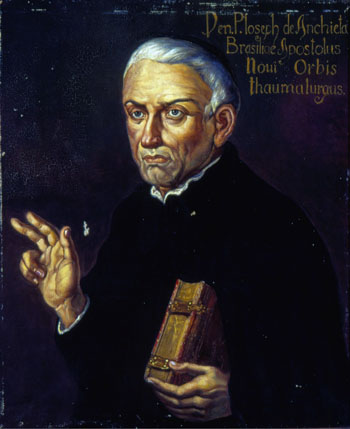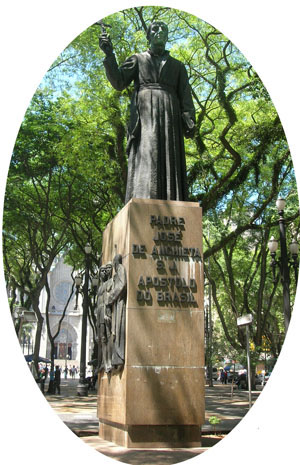The Saint of the Day
 |
 |
 |
 |
 |
 |
 |
Venerable José of Anchieta - June 9
On June 9 we celebrate the anniversary of the death of Fr. José of Anchieta (1534-1597). He was the evangelizer of Brazil, the founder of São Paulo, a Venerable of the Catholic Church and, without a doubt, the greatest figure who has walked on our Brazilian soil. It is probable, however, that a great number of our fellow Brazilians do not know him.
 Even here, in the city of São Paulo – where the celebrations for the 3rd centenary of his death in 1897 gathered eminent personalities such as Msgr. Francisco de Paula Rodrigues, Eduardo Prado, Brasílio Machado, Joaquim Nabuco among many others and where the commemorations for the 4th centenary of his birth in 1934 are still remembered by many – there is nothing to promote daily devotion to this great Jesuit.
Even here, in the city of São Paulo – where the celebrations for the 3rd centenary of his death in 1897 gathered eminent personalities such as Msgr. Francisco de Paula Rodrigues, Eduardo Prado, Brasílio Machado, Joaquim Nabuco among many others and where the commemorations for the 4th centenary of his birth in 1934 are still remembered by many – there is nothing to promote daily devotion to this great Jesuit.
Nonetheless, José of Anchieta should be more present in the heart of our Brazilian people. We should know him so that we might imitate his works and spirit: José of Anchieta is an example for the Brazilian Catholics today. Everything in his life is perfectly adapted to the needs of our Country, and continues to be appropriate for the apostolate today: The labor, sacrifice, harmonization, obedience, order and peace he promoted, but also the war he engaged in against the enemies of the Fatherland and the Church so that he might give the indigenous people the purest Catholicism. This is what Brazil needs today.
José of Anchieta is an example for the Brazilian Catholics today. Everything in his life is perfectly adapted to the needs of our Country, and continues to be appropriate for the apostolate today: The labor, sacrifice, harmonization, obedience, order and peace he promoted, but also the war he engaged in against the enemies of the Fatherland and the Church so that he might give the indigenous people the purest Catholicism. This is what Brazil needs today.
May Brazilian Catholics turn to José of Anchieta and take him as their model to restore order so that Brazil may be renewed in Christ Our Lord, leaving aside the vile fights provoked by petty ambitions, and taking a position of readiness to enter the great battles for the cause of the Church.
Let us thank God that the Marian youth of Brazil, who love Our Lady as José of Anchieta loved her, are writing the great poem of the revival of the Faith in Brazil at the same time it energetically arms itself for the great combats this entails. And José of Anchieta is their glorious leader.
 Article from O Legionário, June 6, 1937
Article from O Legionário, June 6, 1937


The Saint of the Day features highlights from the lives of saints based on comments made by the late Prof. Plinio Corrêa de Oliveira. Following the example of St. John Bosco who used to make similar talks for the boys of his College, each evening it was Prof. Plinio’s custom to make a short commentary on the lives of the next day’s saint in a meeting for youth in order to encourage them in the practice of virtue and love for the Catholic Church. TIA thought that its readers could profit from these valuable commentaries.
The texts of both the biographical data and the comments come from personal notes taken by Atila S. Guimarães from 1964 to 1995. Given the fact that the source is a personal notebook, it is possible that at times the biographic notes transcribed here will not rigorously follow the original text read by Prof. Plinio. The commentaries have also been adapted and translated for TIA’s site.

Ven. José de Anchieta
Nonetheless, José of Anchieta should be more present in the heart of our Brazilian people. We should know him so that we might imitate his works and spirit:
- His indefatigable labors for the good of the indigenous peoples by his many missionary journeys into the wilderness;
- His difficult crossings of the Serra do Mar (a long chains of mountain ranges in Southeastern Brazil) in the grinding and difficult work of the apostolate;
- His love for peace and concord in his offering himself as hostage to the Tamoios Indians, placing his life in risk among those aborigines in order to maintain order in the life of the Colony;
- The efforts to harmonize the Mamelukes, the Indians and the Portuguese people, uniting them all in the same love for Jesus Christ through the Padres, representatives of the Papal Authority in the lands of Brazil;
- His example when he accompanied his Indians to Rio de Janeiro to help Governor Estácio de Sá forcibly expel the Calvinist invaders;
- His constant obedience to the Catholic Church, his love for Our Lord Jesus Christ, his veneration of the Most Holy Virgin, so movingly expressed in the poetry he wrote in the sands of the beaches of São Vicente.

Anchieta writing poetry to Our Lady
in the sands of São Vicente's beaches
May Brazilian Catholics turn to José of Anchieta and take him as their model to restore order so that Brazil may be renewed in Christ Our Lord, leaving aside the vile fights provoked by petty ambitions, and taking a position of readiness to enter the great battles for the cause of the Church.
Let us thank God that the Marian youth of Brazil, who love Our Lady as José of Anchieta loved her, are writing the great poem of the revival of the Faith in Brazil at the same time it energetically arms itself for the great combats this entails. And José of Anchieta is their glorious leader.

Apostle of Brazil José de Anchieta
honored in downtown São Paulo

 | |
|
|
The texts of both the biographical data and the comments come from personal notes taken by Atila S. Guimarães from 1964 to 1995. Given the fact that the source is a personal notebook, it is possible that at times the biographic notes transcribed here will not rigorously follow the original text read by Prof. Plinio. The commentaries have also been adapted and translated for TIA’s site.


